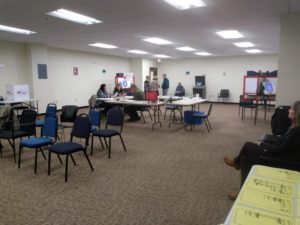
Voting @ Jackson County Board of Elections. Photo by: Chandler Keller
North Carolina General Assemble passed Session Law 2013-381 (HB 589), VIVA Election Reform, requiring all 100 counties to use a voting system that produces a paper ballot, ‘an individual paper document that bears marks made by the voter by hand or through electronic means.’
Prior to 2020, Jackson and the 34 other counties used Direct Record Electronic (DRE) voting machines. These touch-screen machines would electronically record the voter’s choices and provided a Real-Time Audit log with the receipt paper to the left of the screen, allowing the voter to review their selection.
This elections year, Jackson county is using new ballot marking device that is touch screen and similar to the previous DRE machines, but does not record the voter’s selection electronically, rather it ‘marks’ the voter’s selection on a rectangular piece of paper previously inserted by the voter. After the voter is done making their selection, they can retrieve their paper from the ballot marking device and insert the paper into the ds200 scanner, a ballot tabulating device that is responsible for recording the votes.
“I think it’s the best of both worlds,” the director at Jackson County Board of Elections, Lisa Lovedahl, said. “We’ve got the paper ballet system that we are now required to have by North Carolina law, but we are not moving completely to that, we are still utilizing touch-screen ballet marking devices, so that voter intent is well-known.”
The ballot marking device is inclusive for people with disabilities and shows a more accurate picture of voter intent. This is because the machine will not allow voters to under vote or over vote, it gives readers prompts, insures they view all candidates and alleviates the chances of human/scanner error i.e half way filling in a bubble. The paper-ballot will contain every office and candidate voted for, and officials are asking voters to double-check their paper-ballot before placing it into the DS200 scanner. With this process, voter intent is more clear and voter ballots are to remain secure within the DS200 scanner and “act as a back-up record for purposes of any hand-to-eye count, hand-to-eye recount, or other audit (Session Law 2013-381, § 163-165.7.).”
The DS200 scanner has not been used in Jackson county but has been used in other N.C. counties, such as Buncombe and Hendersonville. Additionally, the ballot marking device has not been used in N.C. before but has been used in other states like Missouri in 2016.
A test video of the ballot tabulating device used in Missouri.
However, some citizens still have concerns with the ballet marking device using bar codes to portray voter selection. The printed paper ballot displays voter’s choices but also contains bar codes at the top of the ballot that is what the DS200 machine actually reads as the voter’s answers. Some argue the bar codes could translate to something different than what the voter chose, additionally, some believe these types of codes can be open to cyber manipulation.
Citizens have also voiced issues with DRE machines in the past for being reliant on electronic memory. Speaking on the DRE machines at the time, Brooks Jones, North Carolina’s voting systems manager, said “Both the ballots and the unique IDs are exported from the voting machines to a county computer used to count all the votes.” One county computer storing the entirety of that counties votes would cause the system to be vulnerable to hackers (The Guardian).
Lastly, according to Carolina Public Press some experts would say hand-marked paper ballets are the most secure. However, there is a higher chance of human/scanner error and as a result, voter intent is not as clear. Also, they are not inclusive to people with a disability who cannot write or hold a pencil to vote. Finally, the hand-marked ballot is placed in a scanner similar to the DS200 where they are stored and later double checked by polling officials.
Although both systems are new to Jackson county, Lovedahl says voters should not worry about security because the system has been approved federally by the U.S Elections Assistance Commission (EAC) and certified by North Carolina.



